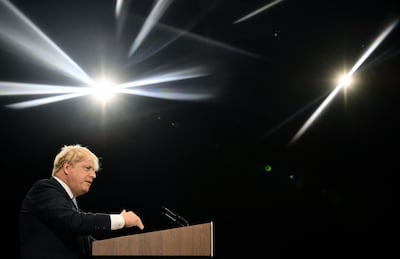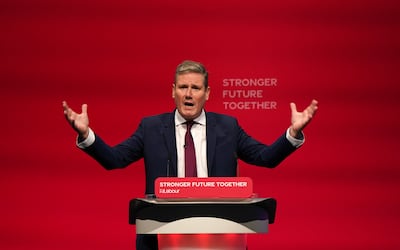Britain’s Prime Minister Boris Johnson told businesses they can no longer “use immigration as an excuse for failure to invest” in workers as he unveiled his plan to boost wages.
He used his keynote speech at the Conservative Party conference on Wednesday to urge business leaders to pay staff more in an attempt to attract more Britons to lower-wage roles instead of relying on cheap foreign labour.
In an attempt to hammer home a point about his “levelling up” agenda, Mr Johnson told guests at the Manchester gathering that his government has “the guts” to oversee a significant shift to a “high-wage, high-skill, high-productivity economy”.
In his wide-ranging speech, he spoke about the need for tax increases to fill a gaping hole in public finances caused by Covid, said he wants to unleash the spirit of the nation, and accused the opposition Labour party of flapping on Covid.
The prime minister is said to be only weeks away from signing off on a minimum wage increase as he looks to lead from the front in establishing higher pay in society.
“The answer is to control immigration, to allow people of talent to come to this country but not to use immigration as an excuse for failure to invest in people, in skills and in the equipment or machinery they need to do their jobs,” he told the packed auditorium.
“We are not going back to the same old broken model with low wages, low growth, low skills and low productivity, all of it enabled and assisted by uncontrolled immigration.”
Shift from uncontrolled immigration ‘will be difficult’
Mr Johnson admitted his changes to the economy after Brexit will at times be difficult but insisted they will result in a fairer, “low tax” system. He said that controlled immigration and investment will reshape the nation and the new system would still allow “people of talent” to come from overseas to work in Britain.
“That’s the direction in which the country is going now – towards a high-wage, high-skilled, high-productivity and, yes, thereby a low-tax economy," he said. "That is what the people of this country need and deserve.
“Yes it will take time and sometimes it will be difficult but that was the change that people voted for in 2016 and that was the change that people voted for again powerfully in 2019 and to deliver that change we will get on [with] uniting and levelling up across the UK.”
He was referring to the June 2016 EU referendum, in which Britons voted to leave the EU, and the December 2019 general election in which the Conservatives won back their parliamentary majority.

Businesses criticise against anti-immigration plan
The prime minister's drive to reduce companies' reliance on overseas workers puts him at loggerheads with farmers and businesses, long seen as the foundation of support for the Tories.
Craig Beaumont, chief of external affairs at the Federation of Small Businesses, called the government’s message “pretty horrifying”.
Simon Wolfson, chief executive of fashion chain Next and a Conservative peer, criticised the government’s attempt to deter companies – including pig farms – from bringing in immigrant workers to meet demand. He suggested businesses should still be able to obtain visas for overseas staff but should have to pay them the same as a UK worker as well as a visa tax.
Referring to Mr Johnson’s plan, Lord Wolfson told BBC Radio 4’s Today programme: “I think that approach leads to queues at petrol stations and pigs being unnecessarily shot, so I don’t think that’s a particularly constructive approach.
“I think a much more constructive approach is to say, well if we think the problem is that business is bringing in people because they’re cheap, then let’s make them more expensive.”
He said his preferred strategy would be to ensure business leaders can access foreign labour if required. He said there would still be a “huge incentive to employ people in the UK if those people are available”.
Mr Johnson is said to be planning to raise the so-called national living wage – the minimum wage paid to those over the age of 23 – by 5 per cent, bringing it up to about £9.42 ($12.79) an hour.
On Tuesday he was grilled on ITV News about a possible increase in the hourly flat rate but declined to give a definitive answer, saying: “We will take guidance from the low pay commission, and we will see where we get to.”
Opposition party Labour has seized on the prime minister’s message to boost wages as a tool to show he is seemingly out of touch with the reality faced by millions of Britons.
His speech on Wednesday coincides with the government withdrawing a £20-per-week increase in Universal Credit, which was ushered in at the beginning of the Covid-19 pandemic. The benefit, which comprises a single monthly payment, was introduced in 2013 to replace six different payments from the Department of Work and Pensions.
While Mr Johnson was on stage bellowing his message about the need for higher wages, Labour drove a van around the perimeter of the conference venue, displaying a poster urging ministers to “cancel the cut” to the household incomes of millions.
The closing speech at Manchester Central comes against the backdrop of a supply chain crisis, a chronic shortage of heavy good vehicles that has led to the military being drafted in to drive tankers, and warnings of empty shop shelves at Christmas. Farmers are also being forced to cull pigs and incinerate their remains because of a shortage of abattoir staff.
So far hundreds of healthy pigs have been killed as a result of the shortages. The National Pig Association said up to 120,000 animals may need to be destroyed if a solution is not found.
Duncan Berkshire, a pig veterinary surgeon in North Yorkshire, said farmers had found themselves in a devastating situation that was leading to “absolutely abhorrent food wastage”.
“If we don’t get movement soon, the backlog of pigs that is present on farms at the moment, we are going to have to enact some of these more drastic actions at a later point to ensure that the welfare of those pigs is maintained,” he told BBC Radio Four’s Today programme.
But despite growing concerns among consumers and industry figures, Mr Johnson defended his restrictions on foreign workers. He said the government is “embarking now on the change of direction that has been long overdue in the UK economy”.
The prime minister, whose landslide victory in 2019 gives him a Commons majority that allows him to take potentially unpopular decisions, promises to end the failure by successive governments to grasp the big issues.
'Meteorite through public finances'
One of the problems he highlighted was adult social care, which the Tories have promised to reform using money raised from a 1.25 percentage-point increase in National Insurance. The change to the UK-wide tax will come into effect in April and be levied on businesses and workers.
The bill for Covid support has topped £407 billion ($552.2 billion) and the country’s debt is more than £2 trillion.
Mr Johnson insisted it would not be responsible of his government to borrow money to fill the “huge hole in public finances” left by the coronavirus crisis.
He invoked former Conservative prime minister Margaret Thatcher, saying she “would not have ignored the meteorite that has just crashed through public finances” and would have rebuffed advice to borrow, which would lead to higher interest rates farther down the road.
“After decades of drift and dither, this reforming government, this can-do government that got Brexit done, is getting the vaccine roll-out done and is going to get social care done,” he said.
“We are dealing with the biggest underlying issues of our economy and society.
“The problems that no government has had the guts to tackle before.”
He also touched on his experience of being treated for Covid in hospital in April 2020, praising NHS staff for caring for him and other patients during the public health crisis.

Levelling up
The Prime Minister’s promise to “level up” parts of the country that had missed out on the economic success of London and the south-east was a key part of his pitch to voters in former Labour areas – the so-called Red Wall.
But the Chesham and Amersham by-election defeat in June is causing concern among Tories about the focus on northern areas. On Wednesday, Mr Johnson attempted to bridge that gap by insisting that all parts of the UK can benefit from his plans.
“There is no reason why the inhabitants of one part of the country should be geographically fated to be poorer than others,” he said.
“Or why people should feel they have to move away from their loved ones or communities to reach their potential.”
Levelling up, he said, “helps to take the pressure off parts of the overheating south-east, while simultaneously offering hope and opportunity to those areas that have felt left behind”.
He also spoke of his desire to unleash the spirit of the nation, referring to the spirits of NHS nurses, entrepreneurs, the England football team, Olympians, Paralympians and tennis star Emma Raducanu.
“Not only the achievement of those elite athletes but a country that is proud to be a trailblazer, to judge people not by where they come from but by their spirit, by what is inside them,” he said.
“That is the spirit that is the same across this country, in every town and village and city that can be found in the hearts and minds of kids growing up everywhere and that is the spirit we are going to unleash.”
He made a jibe about Labour leader Sir Keir Starmer and accused the party of performing dismally during the pandemic.
“Remember Labour’s performance during the pandemic? Flapping with the conviction of a damp tea towel,” he said.
He said Mr Starmer had “looked like a seriously rattled bus conductor” who was being “pushed this way and that by a Corbynista mob” of people loyal to former Labour leader Jeremy Corbyn.

